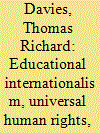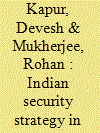| Srl | Item |
| 1 |
ID:
141055


|
|
|
|
|
| Summary/Abstract |
Robert Owen, the early nineteenth-century social reformer, made a greatly more significant contribution to the theory and practice of International Relations than has hitherto been assumed. This article shows how Owen helped to develop an understudied but distinctive form of internationalist thought focusing on the role of education in the pursuit of peace. Owen's previously neglected contributions to human rights norms and to international organisation are also explored, including his promotion of universal rather than nationally-oriented human rights standards, his role in the nascent movement towards the formation of international non-governmental organisations, and his contribution to international federalist ideas. Following an introduction to Owen's place in the literature, this article discusses each of these contributions of Owen to the theory and practice of International Relations in turn. The analysis reveals that Owen's contributions in each of these aspects are as significant for their limitations as for their insights
|
|
|
|
|
|
|
|
|
|
|
|
|
|
|
|
| 2 |
ID:
158427


|
|
|
|
|
| Summary/Abstract |
As India assumes an increasingly salient role in world politics, questions of strategy have come to the fore in the study of Indian security. There is growing scholarly interest in Indian strategic thought and practice across a range of areas including conventional military power, nuclear weapons, maritime security, counterinsurgency, counterterrorism, and international regimes. This collection of articles expands the horizon of inquiry in some of these areas by situating Indian strategy in its historical context, by challenging conventional wisdom, and by opening new lines of research. In the following sections, we lay out the contours of what the contributors to this special issue collectively take to mean by strategy and then situate the issue in the literature on Indian strategy. We subsequently provide some over-arching observations on Indian strategy that emerge from the articles collected here and conclude by raising some questions regarding the intellectual and practical primacy of strategy in statecraft today.
|
|
|
|
|
|
|
|
|
|
|
|
|
|
|
|